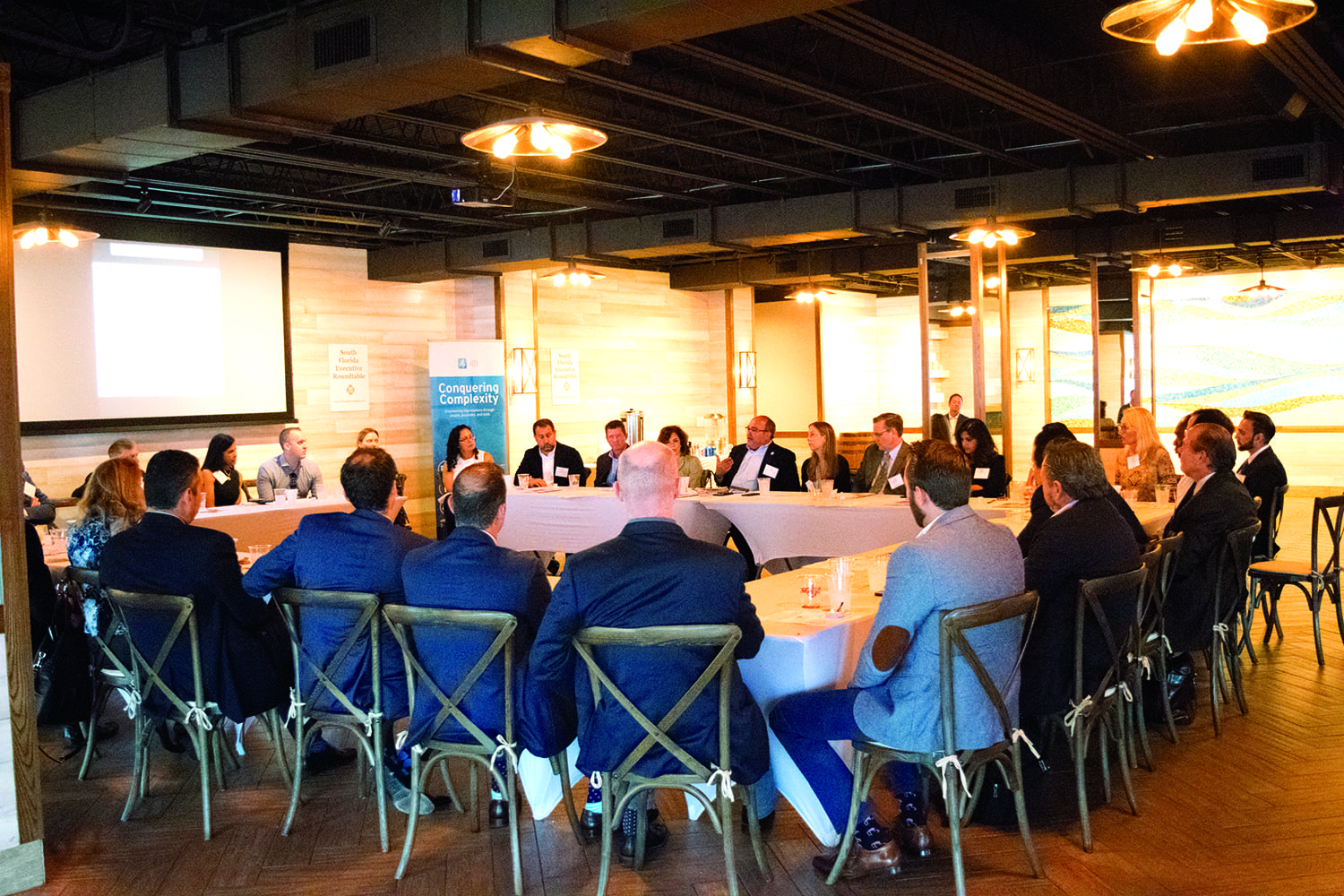[vc_row css_animation=”” row_type=”row” use_row_as_full_screen_section=”no” type=”full_width” angled_section=”no” text_align=”left” background_image_as_pattern=”without_pattern”][vc_column width=”2/3″][vc_column_text]
The South Florida Executive Roundtable had a twist on its usual format in early May, with an interactive audience exercise instead of the usual lineup of panelists.
Sitting in a large square of tables at Monty’s Raw Bar in Coconut Grove, the audience filled with experts talked about topics that included hiring and retention, lending and cybersecurity,
Moderator Carlos Arboleda, managing partner of COI Access and co-chairman of the roundtable, kicked off the discussion by saying he was at a presentation about the war for talent, and the conclusion was, “The war for talent is over and talent won.”
Some advice quickly followed.
Bill Russell, business development executive with Grant Thornton, said employers shouldn’t wait until prospects are in their senior years. “We’re approaching sophomores already,” he said.
Kevin Murdock, president and founder of Business Value Accelerator, said, “You can win the war by giving a meaningful role that lets people grow.” He also endorsed the idea of working with recruiters. “It’s totally worth the investment to bring a strong candidate list to you,” he said.
Two panelists talked about the importance of making a personal connection to attract and retain staff members.
“People leave people, not companies,” said Gerry Litrento, senior executive vice president at BankUnited.
Grant Killingsworth of CBRE said employees should try to look at their organizations through different lenses. GlassDoor.com, which has employee reviews of companies, is one way to do that. “There are bad apples in every organization. Sometimes, management is not connected to what employees are saying,” he said.
Dan Saucier, SFBW’s Miami market manager, offered a millennial’s point of view, saying some of his friends have taken jobs with a better experiential feel over a job that may have paid more. Millennials also like the flexibility to make their own schedules.
Steve Nunn, president of Nunn Better Consulting, said new hires need to go beyond a typical orientation and experience a program that offers education and training. Make sure that you are making it easy to solve small problems, such as how to make a purchase or put in a travel request.
Switching topics, Arboleda asked if the need for credit was high.
Marc Bayard, vice president and treasury management consultant at BB&T, said, “It’s as competitive of a credit market as I’ve seen in last 10 years. There’s a significant demand for credit. Those qualified to borrow get offers on terms and structure, and they have their choice. They are at the top of the line. They are hungry and want to expand and they get their pick.”
Russell, of Grant Thornton, says he is seeing a shift toward more equity transactions.
Maya Mylavarapu, of Woodforest Bank, said, “Even if commercial banks are retrenching, there will always be unregulated lenders willing to do a deal with better terms. There’s too much capital and too few opportunities.”
With some cybersecurity experts in in the audience, Arboleda asked what companies can do to protect themselves, especially when hackers could go undetected for months.
David Ralph, BankUnited’s vice president of software engineering and development and software quality assurance, said the traditional approach to build a firewall doesn’t work anymore. The problem is that hackers and the use of Trojan horses (data-stealing software) can still get inside.
The approach now is to have layered and segmented protection with security ingrained into every aspects of systems, he said.
A new model by Amazon Web Services integrates security into the cloud, and many chief information officers are looking at moving into the cloud, Ralph said. That can be especially helpful for businesses that don’t have security specialists on staff.
Guillermo Benites, vice president of financial services at United Data Technologies, said corporate governance from the top on down needs to emphasize security. “Human beings are the weakest link and criminals know that. They go after them with phishing attacks,” he said. “There is no silver bullet. It’s a matter of not if, but when.”
Camille Vogl, marketing coordinator at 4IT, said continuous and random security awareness training is essential. Her company will send test emails to clients’ employees. If they click on something they shouldn’t, they are sent to a website to get remedial training.
Even those seemingly innocuous unsubscribe buttons can be dangerous, Arboleda said. A bit of internet research backs up his warning: If you put your email address in an unsubscribe website, you are likely helping spammers build their email lists. If you enter your account name and password into a bogus site, you’ve set yourself up to be hacked. ♦
SFBW is the exclusive media partner of the South Florida Executive Roundtable. For more information on SFER, visit SFexecRoundtable.com.
[/vc_column_text][/vc_column][vc_column width=”1/3″][vc_gallery interval=”3″ images=”32697,32698,32700,32701,32702″ img_size=”full” show_image_description=”yes”][/vc_column][/vc_row]














